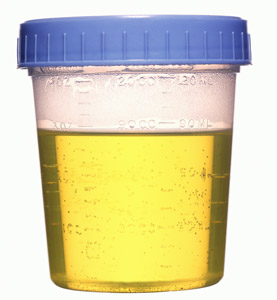
Davies and Starr/Getty
Researchers at University of North Carolina at Greensboro are examining whether urine tests might provide another alternative to (colonoscopy and virtual colonoscopy) for colon cancer screening. In an initial study, published in the American Chemical Society’s Journal of Proteome Research, investigators recruited 123 participants—60 who had been diagnosed with colon cancer, and 63 who had not. They analyzed urine samples from all participants to determine whether there were notable composition differences in the samples taken from cancer patients. They found that 16 different substances were present in unusual amounts in cancer patients’ urine—including elevated levels of the amino acid tryptophan. The elevated levels of the amino acid in urine may be an indicator of colorectal cancer, they say: “[O]ur observations may indicate that the up-regulated tryptophan metabolism is highly associated with [colorectal cancer] morbidity.” The researchers also analyzed urine samples from both healthy rats and rats with colon cancer, similarly finding unique characteristics in the samples taken from the rats with cancer. Researchers say that identifying the markers found in urine samples taken from colon cancer patients is a first step toward potentially developing urine tests to screen for the disease.
Increasingly doctors are working to develop urine tests to screen for a broad range of illnesses and ailments—to detect everything from potential adverse reactions to medication to appendicitis to prostate cancer.

